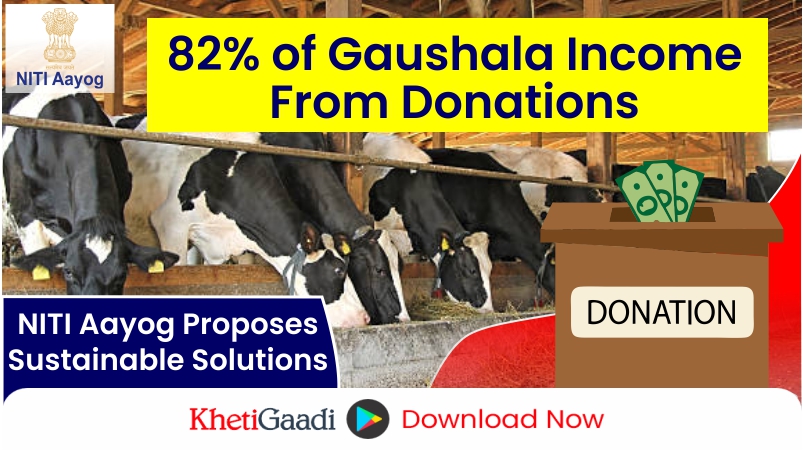NITI Aayog Proposes Organic Farming to Support Gaushalas
In a move to promote sustainable farming and improve the financial viability of gaushalas (cow shelters) across India, NITI Aayog has released a detailed report highlighting the potential of these shelters in the production and promotion of organic and biofertilizers. The report underscores the role gaushalas can play in reducing reliance on chemical fertilizers while addressing the growing issue of stray cattle in both rural and urban areas.
KhetiGaadi always provides right tractor information
The Role of Gaushalas in India
Gaushalas have long been a sanctuary for stray, abandoned, and unproductive cattle. According to the 20th Livestock Census, India is home to over 19 crore cattle, a significant portion of which are abandoned after they stop producing milk or are no longer useful for draught power. These animals often roam freely, causing damage to crop and contributing to road accidents. Gaushalas provide a humane solution by offering care and shelter for these animals, aligning with traditional Indian values of animal welfare. Beyond their social role, gaushalas also help preserve indigenous cattle breeds, contributing to sustainable agricultural practices.
Financial Struggles of Gaushalas
Despite their vital role, gaushalas face financial challenges. Many shelters operate at a loss, with 82% of their income coming from donations, according to studies cited by NITI Aayog. Operating costs, including feed, fodder, and veterinary care, often exceed these donations, leaving gaushalas in a precarious financial state.
However, the report highlights a solution: by turning cow by-products, such as dung and urine, into organic fertilizers, bio-pesticides, and bioenergy, gaushalas can diversify their income streams. Some shelters have already implemented biogas plants and organic fertilizer production, proving that these initiatives can generate steady revenue. If supported by appropriate business models and government policies, gaushalas have the potential to become self-sustaining entities.
Key Findings and Recommendations
The report offers several key recommendations to improve the sustainability of gaushalas:
- Integration with Natural Farming: Gaushalas can supply organic inputs like biofertilizers and biopesticides to the growing natural farming sector, reducing the use of chemical fertilizers.
- Public-Private Partnerships: Collaboration between gaushalas, private enterprises, and government bodies can create scalable production models for organic fertilizers and bioenergy.
- Diversification of Income: By producing and selling products like Phosphate Rich Organic Manure (PROM), biogas, and Bio-CNG, gaushalas can become financially independent.
- Government Support: The report calls for policy support in the form of subsidies and incentives for gaushalas adopting sustainable practices, such as organic fertilizer production.
A Path Toward Sustainable Agriculture
The task force emphasizes that integrating gaushalas into the broader framework of organic farming and sustainable agriculture can yield significant benefits. By focusing on utilizing cattle by-products effectively, gaushalas can contribute to solving India’s environmental and agricultural challenges while addressing the issue of stray cattle.
Furthermore, the initiative could create employment opportunities and support India’s push towards Atmanirbhar Bharat (self-reliant India), reducing dependence on chemical fertilizers
Supporting sustainable farming practices
With the right support and implementation, gaushalas have the potential to evolve into self-sustaining entities that not only care for abandoned cattle but also play a pivotal role in India’s agricultural future.
For more real-time updates on agricultural schemes and innovative cultivation methods, stay connected with us through our WhatsApp channel.
Visit KhetiGaadi regularly for in-depth information aimed at supporting our hardworking farmers.
To know more about tractor price contact to our executive






